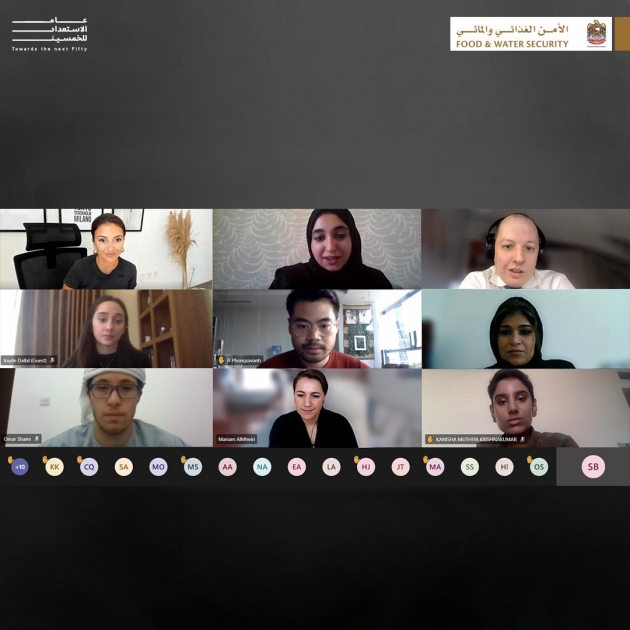
Food And Water Security Office Discusses Community’s Role In In The Uae’s Food And Water Landscape For The Next 50 Years
As part of its efforts to realise the ‘Designing the Next 50’ project, the UAE Food and Water Security Office organised a virtual workshop to explore plans and initiatives for enhancing food security in the UAE for the next 50 years.
The ‘Designing the Next 50’ project was launched by His Highness Sheikh Mohammed bin Rashid Al Maktoum, Vice President and Prime Minister of the UAE and Ruler of Dubai, with the aim of involving community members, citizens and residents, in designing the future of the UAE and setting the pillars and components of the UAE Centennial 2071 Plan the comprehensive development plan for the UAE for the next 50 years, and based on the UAE strategy and the concerted efforts of all entities under the supervision of the 50-year Development Plan Committee, chaired by H.H. Sheikh Mansour bin Zayed Al Nahyan, Deputy Prime Minister and Minister of Presidential Affairs.
The workshop was attended by Her Excellency Mariam Almheiri, Minister of State for Food and Water Security, along with representatives from relevant entities and members of the community.
Discussions at the workshop explored the present and future challenges facing the National Food Security Strategy in the UAE, which was designed to identify prominent future trends in the sector. In addition, the session outlined a set of future challenges that threaten the world’s food and water resources, and discussed the role that the community and individuals can play to help address these challenges.
“Food and water security is a cornerstone of sustainability plans for any community,” H.E. added. “With that in mind, and with the UAE’s 50th anniversary drawing closer, sessions and workshops like this one offer a constructive opportunity to outline a joint operation framework that facilitates collaboration and encourages innovative ideas and solutions for potential challenges. And this is vital for our efforts to build a more resilient future of the sector, and implement the UAE’s vision.”
The workshop explored various innovative solutions for growing local food production and diversifying sources of import. Participants also discussed ways to truly engage all segments of the community to transition to more sustainable food systems, raising awareness about the importance of nutrition and the need to reduce food waste.
The session shed light on the National Food Security Strategy’s key pillars and objectives, as well as the main challenges it faces. Recent global challenges have created tremendous logistical difficulties for supply chains and the supply of agricultural and food products – challenges that called for immediate intervention from governments to set up systems that ensure more self-sufficiency and food security for countries. Food security is among the foundations of stable societies and catalysts for their welfare and progress.
The workshop showcased various aspects of food security in the UAE, underlining future trends that affect this vital sector. It highlighted innovative solutions that help ensure sustainability and food security, as well as the government’s role in adopting the ‘Community Food Security’ approach. Topics of discussion included: food innovations, smart labelling, growing your food at home, raising awareness on local food production, the youth’s role in food systems, agriculture, start-ups, nutrition at all levels, food waste, and the community’s contributions to the sector.
The role of the community and the contributions they make to food security was a leading topic of discussion at the virtual event, which explored tactics for raising awareness about the value of food, and the Food and Water Security Office’s plans to engage the community and promote producing food at home, curbing food waste, popularising healthy nutritional practices, and improving purchasing patterns for food commodities.



























